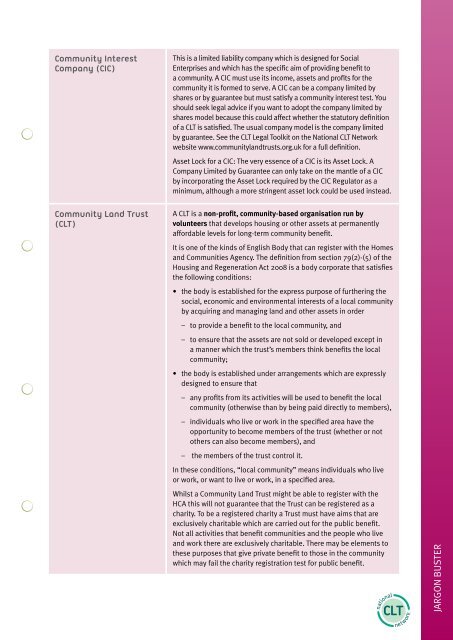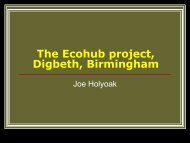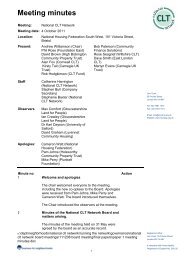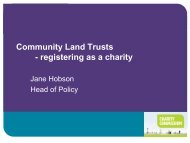CLT Jargon Buster (pdf) - Community Land Trusts
CLT Jargon Buster (pdf) - Community Land Trusts
CLT Jargon Buster (pdf) - Community Land Trusts
Create successful ePaper yourself
Turn your PDF publications into a flip-book with our unique Google optimized e-Paper software.
<strong>Community</strong> InterestCompany (CIC)This is a limited liability company which is designed for SocialEnterprises and which has the specific aim of providing benefit toa community. A CIC must use its income, assets and profits for thecommunity it is formed to serve. A CIC can be a company limited byshares or by guarantee but must satisfy a community interest test. Youshould seek legal advice if you want to adopt the company limited byshares model because this could affect whether the statutory definitionof a <strong>CLT</strong> is satisfied. The usual company model is the company limitedby guarantee. See the <strong>CLT</strong> Legal Toolkit on the National <strong>CLT</strong> Networkwebsite www.communitylandtrusts.org.uk for a full definition.Asset Lock for a CIC: The very essence of a CIC is its Asset Lock. ACompany Limited by Guarantee can only take on the mantle of a CICby incorporating the Asset Lock required by the CIC Regulator as aminimum, although a more stringent asset lock could be used instead.<strong>Community</strong> <strong>Land</strong> Trust(<strong>CLT</strong>)A <strong>CLT</strong> is a non-profit, community-based organisation run byvolunteers that develops housing or other assets at permanentlyaffordable levels for long-term community benefit.It is one of the kinds of English Body that can register with the Homesand Communities Agency. The definition from section 79(2)-(5) of theHousing and Regeneration Act 2008 is a body corporate that satisfiesthe following conditions:• the body is established for the express purpose of furthering thesocial, economic and environmental interests of a local communityby acquiring and managing land and other assets in order– to provide a benefit to the local community, and– to ensure that the assets are not sold or developed except ina manner which the trust’s members think benefits the localcommunity;• the body is established under arrangements which are expresslydesigned to ensure that– any profits from its activities will be used to benefit the localcommunity (otherwise than by being paid directly to members),– individuals who live or work in the specified area have theopportunity to become members of the trust (whether or notothers can also become members), and– the members of the trust control it.In these conditions, “local community” means individuals who liveor work, or want to live or work, in a specified area.Whilst a <strong>Community</strong> <strong>Land</strong> Trust might be able to register with theHCA this will not guarantee that the Trust can be registered as acharity. To be a registered charity a Trust must have aims that areexclusively charitable which are carried out for the public benefit.Not all activities that benefit communities and the people who liveand work there are exclusively charitable. There may be elements tothese purposes that give private benefit to those in the communitywhich may fail the charity registration test for public benefit.JARGON BUSTER






